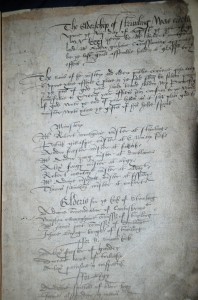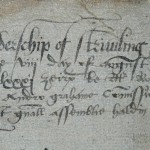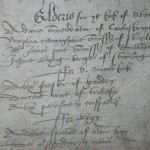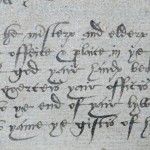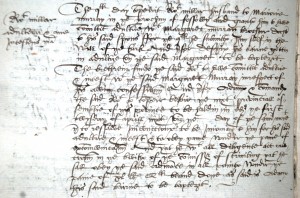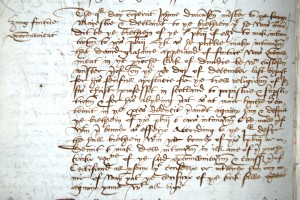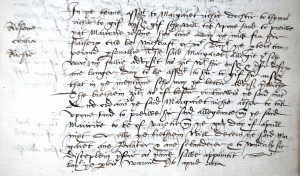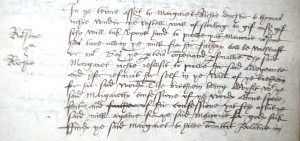This beautifully preserved record is the earliest surviving presbytery minute book in the whole of Scotland. It dates from the very first days of presbyteries in Scotland after the decision leading to their creation was made in April 1581, and provides a continuum of record keeping from the earliest times in the history of the Established Church in Scotland right up to the present day.
The first entry dated the 8th of August 1581 lists the ministers and elders of the various churches attending the first meeting of the Presbytery and records how they have made a “solem promeis in the presens of God, their hands beand haldin up Promiesing faithfullie to exerceis their officis therin to conform to the Word of God unto the end of their lyvis as it sall plais god to minister unto them the giftis of his holie spirit”.
After the Scottish Reformation in 1560, it took some time to finalise how the new state church was to be governed. Although the kirk sessions for each parish were set up first, it was not until the publication of the Second Book of Discipline in 1578 that the subject of the higher church courts was settled. In April 1581, the existing 600 parishes in Scotland were grouped in 50 presbyteries, 13 of which were to be set-up immediately: Edinburgh, St Andrews, Dundee, Perth, Stirling, Glasgow, Ayr, Irvine, Haddington, Dunbar, Chirnside, Linlithgow and Dunfermline. It was agreed that 2 to 3 elders approved by the congregation of each parish should serve and attend the presbytery. As the oath given above suggests, election was for life.
The presbytery ordained ministers, installed ministers in their parishes and could begin or move a congregation. They also dealt with doctrinal matters and discipline cases that the kirk session felt that it could not decide on alone. Consequently, the minutes reflect all aspects of life in early reformation Scotland, from the difficulties some experienced concerning religious observance to relations within marriages and families, and the conduct of people in public.
On the 28th January 1583/4 Robert Millar and Margaret Murray appeared before the Stirling Presbytery accused of incest. He was the husband of her mother’s sister and therefore they were uncle and niece. Such relations were unlawful at this time and both were punished as adulterers. The fact that this case was sent to the presbytery indicates how very seriously this case was taken at the time.
On the 4th February 1583/4, the Presbytery took the decision to excommunicate one David Graham of Fintry for “his feirfull apostacie fra the trew religioun of jesus Christ professit in Scotland to papistrie and superstitioun”. It would appear that David Graham was not able to renounce his previous religious convictions. This must have been a difficult issue for many people at this time.
On the 18th April 1587 the case of Marjorie Robertson against Margaret Richie is heard by the Presbytery. Margaret has accused Marjorie of being a witch, suggesting that Marjorie has “tane away the milk fra hir fatheris cow be witchcraft”. Marjorie takes the case to the Church Courts, making an allegation of slander. The court asks Margaret to give some proof of her allegation. At the final hearing of this case on the 25th April 1587, Margaret confesses her slander and the fact that she compounded the error by asking Marjorie to restore the milk “for godis saik”. This belief that Marjorie was a witch and capable of such a thing makes Margaret guilty of idolatry in the eyes of the Church, as well as slander. She is rebuked and ordered to do penance at her parish church in Stirling for her crimes.

